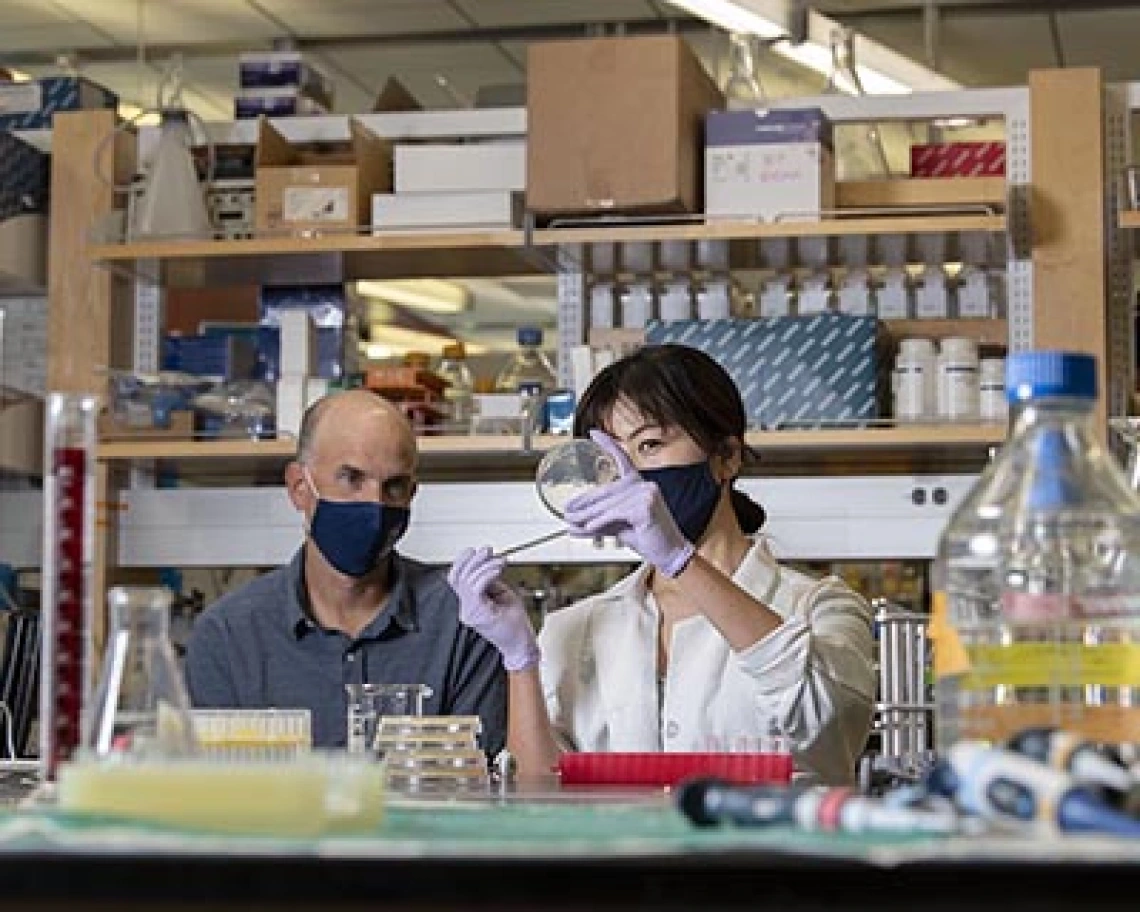Genetically Engineered T Cells Could Lead to Therapies for Autoimmune Diseases

TUCSON, Ariz. — A new study has found that a novel T cell genetically engineered by University of Arizona Health Sciences researchers is able to target and attack pathogenic T cells that cause Type 1 diabetes, which could lead to new immunotherapy treatments.
 The immune system fights bacteria, viruses and other pathogens by utilizing several types of T cells, all of which have receptors that are specific to particular antigens. On killer T cells, the receptor works in concert with three signaling modules and a coreceptor to destroy the infected cell. Michael Kuhns, PhD, an associate professor in the UArizona College of Medicine – Tucson Department of Immunobiology, copied the evolutionary design to engineer a five-module chimeric antigen receptor, or 5MCAR, T cell.
The immune system fights bacteria, viruses and other pathogens by utilizing several types of T cells, all of which have receptors that are specific to particular antigens. On killer T cells, the receptor works in concert with three signaling modules and a coreceptor to destroy the infected cell. Michael Kuhns, PhD, an associate professor in the UArizona College of Medicine – Tucson Department of Immunobiology, copied the evolutionary design to engineer a five-module chimeric antigen receptor, or 5MCAR, T cell.
“The 5MCAR was an attempt to figure out if we could build something by biomimicry, using some of evolution’s natural pieces, and redirect T cells to do what we want them to do. We engineered a 5MCAR that would direct killer T cells to target autoimmune T cells that mediate Type 1 diabetes,” said Dr. Kuhns, who is member of the UArizona Cancer Center, BIO5 Institute and Arizona Center on Aging. “So now, a killer T cell will actually recognize another T cell. We flipped T cell-mediated immunity on its head.”

Dr. Kuhns worked with Thomas Serwold, PhD, of the Harvard Medical School-affiliated Joslin Diabetes Center, to test the 5MCAR T cells in a non-obese diabetic mouse model with promising results. The findings recently were published in the Proceedings of the National Academy of Sciences.
“When we saw that the 5MCAR T cells completely eliminated the harmful T cells that invaded the pancreas, we were blown away,” Dr. Serwold said. “It was like they hunted them down. That ability is why we think that 5MCAR T cells have tremendous potential for treating diseases like Type 1 diabetes.”
In 2017, the U.S. Food and Drug Administration approved two chimeric antigen receptor (CAR) T cell therapies for specific types of cancer – one for the treatment of children with acute lymphoblastic leukemia and the other for adults with advanced lymphomas. Those CAR T cells focused solely on the receptor, not the surrounding signaling modules or coreceptor.
Dr. Kuhns believes that by mimicking the form and function of a natural T cell, including its complex five-module structure, researchers will be able to more specifically target antigens with greater sensitivity in the future. This type of personalized immunotherapy is a key initiative of the UArizona Health Sciences, as well as a focus of Dr. Kuhns’ lab.

“I'm generally of the belief that evolution converges on related principles to execute related tasks,” Dr. Kuhns said. “Basic research from labs around the world, including ours, has helped us to understand the complex structure and function of the five-module molecular machines that have evolved to drive T cell responses. We think these results show that a biomimetic approach holds promise for CAR engineering.”
Drs. Kuhns and Serwold recently received a bridge grant from the National Institute of Allergy and Infectious Diseases to continue their research into using 5MCAR T cells to prevent autoimmune disease.
“There are many things we don't yet know about this technology,” Dr. Kuhns said. “What we know is that it works, and it can be very effective in a mouse model of Type 1 diabetes, so that’s great. Now, we have a lot more work to do.”
The study was funded in part by the National Institute of Allergy and Infectious Diseases, a division of the National Institutes of Health (R01AI101053).
# # #
Another version of this article appeared originally on Tomorrow Is Here on the UArizona Health Sciences website.
NOTE: Images available here – https://arizona.box.com/s/mtemtay2o4qhuhwn99rynl8myj041z0v
About the University of Arizona College of Medicine – Tucson
The University of Arizona College of Medicine – Tucson is shaping the future of medicine through state-of-the-art medical education programs, groundbreaking research and advancements in patient care in Arizona and beyond. Founded in 1967, the college boasts more than 50 years of innovation, ranking among the top medical schools in the nation for research and primary care. Through the university's partnership with Banner Health, one of the largest nonprofit health care systems in the country, the college is leading the way in academic medicine. For more information, visit medicine.arizona.edu (Follow us: Facebook | Twitter | Instagram | LinkedIn).
About the University of Arizona Health Sciences
The University of Arizona Health Sciences is the statewide leader in biomedical research and health professions training. UArizona Health Sciences includes the Colleges of Medicine (Tucson and Phoenix), Nursing, Pharmacy, and the Mel and Enid Zuckerman College of Public Health, with main campus locations in Tucson and the Phoenix Biomedical Campus in downtown Phoenix. From these vantage points, Health Sciences reaches across the state of Arizona, the greater Southwest and around the world to provide next-generation education, research and outreach. A major economic engine, Health Sciences employs nearly 5,000 people, has approximately 4,000 students and 900 faculty members, and garners $200 million in research grants and contracts annually. For more information: uahs.arizona.edu (Follow us: Facebook | Twitter | YouTube | LinkedIn | Instagram).

